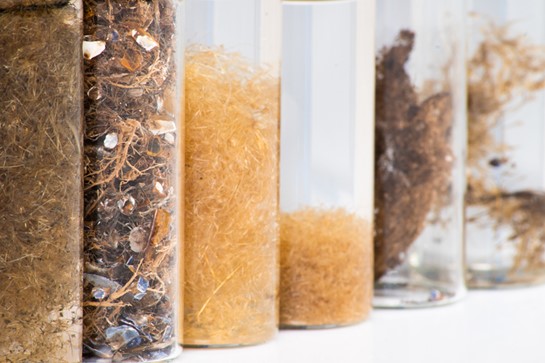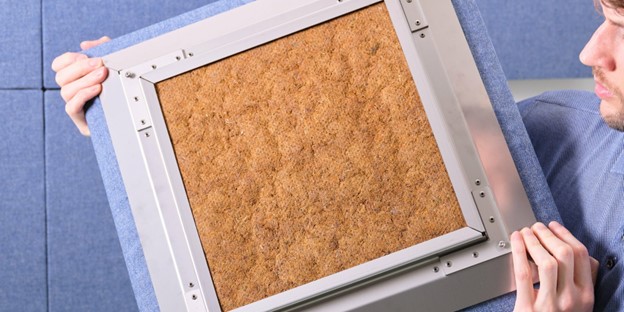
Founded in June 2021 by Belgian designer Sander Nevejans, Seastex has developed a groundbreaking method to convert mussel beard (byssus) waste into high-quality acoustic materials and products.
Byssus filaments are natural fibers created by certain kinds of marine and freshwater bivalve mollusks, which use the byssus to anchor themselves to rocks, substrates, or seabed. In edible mussels, the byssus, also known as the ‘beard’, is a part of the inedible mussel that is typically removed before cooking or packaging.
Nevejans says the fibers, named ABC (Acoustic Byssus Core) tiles, are a competitive material due to their physical attributes. Their low density makes them lightweight, and they have remarkable stability, ensuring that the end products maintain structural integrity over time. Their easy processing through newly developed technologies allows for efficient and cost-effective manufacturing processes, saving time and resources.

After many experiments, the company developed an all-natural treatment process that effectively cleanses large quantities of this waste and transforms the byssus fibers into a uniform and homogeneous material. By developing novel fiber processing technology, Seastex has further revolutionized this byssus material, turning it into a cloud-like substance called “seawool” or “sea bale.”
According to Nevejans, “Byssus fibers possess great potential as high-value and long-lasting materials in the international construction market. Not only do they offer unique acoustic properties for the production of novel sound-absorbing products, but they also contribute towards achieving multiple sustainable development goals. By harnessing the unique properties of byssus fibers, the construction sector can contribute to developing sustainable cities by utilizing eco-friendly materials.‘ Moreover, its cultivation can foster decent work opportunities and economic growth in coastal communities.”

Seastex in-house research further reveals that byssus surpasses other natural and petroleum-based fibers fire safety standards. Byssus demands a higher oxygen level to ignite, hence it seldom supports flames. Even in scenarios where smoldering might occur, it tends to cease rapidly. Moreover, when exposed to extreme heat, the cell membrane structure swells, creating an insulating layer that hinders the spread of fire.
Compared with traditionally produced textiles such as sheep wool, cotton, hemp, or silk, the company says that mussel beards offer a sustainable and environmentally friendly alternative because mussels do not require feeding, antibiotics, or pesticides, reducing the negative impact on ecosystems. Moreover, mussels can remarkably take up carbon dioxide (CO2) when growing, contributing to mitigating climate change. Additionally, mussels play a crucial role in water filtration by filtering microplastics, algae, bacteria, and other small particles, thereby improving water quality.
 TEXTILES.ORG
TEXTILES.ORG


